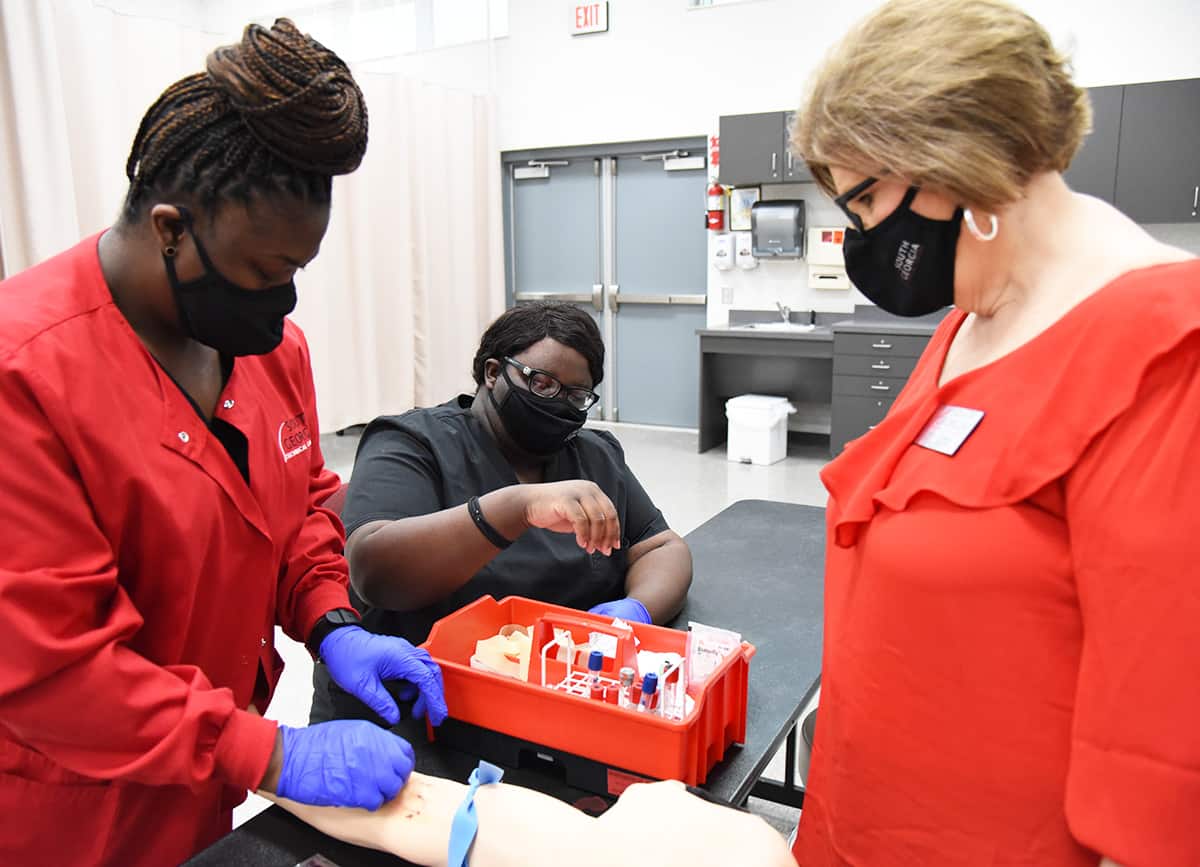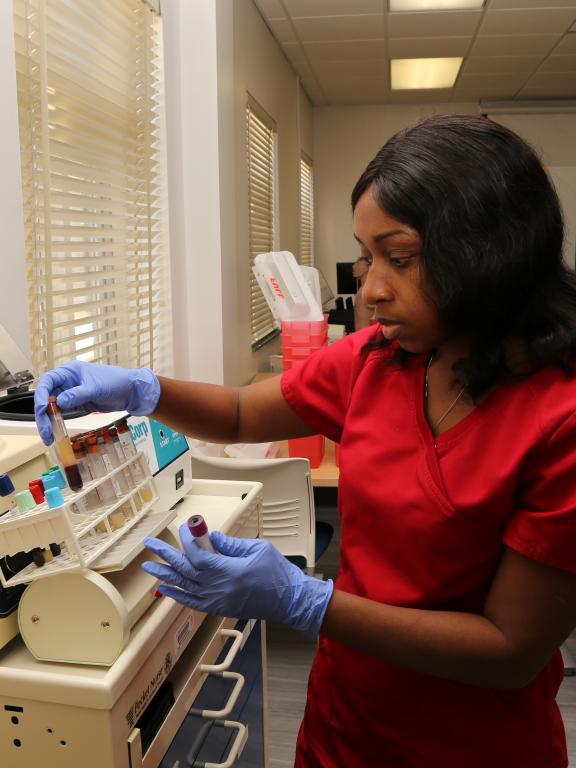What You Need to Know Before Starting a Phlebotomy Training Program for Future Success
Before you start a phlebotomy training program, it's important to understand what the role entails and the skills you'll need to succeed. Looking into accredited programs can establish the structure for your education and learning, but don't neglect the value of hands-on experience and interpersonal skills. You'll likewise intend to take into consideration certification demands particular to your state. So, what should you focus on in your preparation? Allow's discover the essential factors that can shape your future in this area. Phlebotomy Training Course.
Recognizing the Duty of a Phlebotomist
Phlebotomists play an important duty in the healthcare system, as they're accountable for attracting blood examples for tests, transfusions, or contributions. You'll discover yourself working in different setups, like medical facilities, clinics, and laboratories, where precision and expertise are vital. Daily, you'll communicate with clients, explaining procedures to ease their stress and anxiety, which helps construct trust and rapport.
Your jobs consist of preparing tools, maintaining a sterilized setting, and ensuring exact labeling and documents of examples. You'll additionally require to stay updated on security methods and regulations, as patient safety and security is non-negotiable. Phlebotomists typically team up with other health care professionals, adding to accurate medical diagnoses and effective therapy plans.
In this duty, you need to be detail-oriented and efficient, as well as possess a strong sense of empathy. Being a phlebotomist isn't nearly injuring; it's about making a positive effect on people' lives.
Secret Skills Required for Success in Phlebotomy
To flourish in phlebotomy, you'll require a blend of technological and social skills that establish you apart from others in the healthcare area (Phlebotomy Classes Near Me). Initially, mastering venipuncture strategies is important; you should be comfortable with needles and learn to injure efficiently. Focus to information is necessary, as accurate labeling and paperwork can greatly impact person care
Interpersonal abilities likewise play an important role. You'll connect with clients frequently, so being compassionate and approachable aids ease their anxiety. Good interaction abilities are essential for describing procedures and ensuring individuals feel notified and risk-free.
Furthermore, time monitoring and business abilities will maintain you effective, specifically in busy healthcare settings. Lastly, remaining updated on safety and security methods and regulations is non-negotiable to assure both your safety and that of your individuals. By honing these abilities, you'll place yourself for success in the dynamic field of phlebotomy.
Picking the Right Phlebotomy Educating Program
Exactly how can you assure you're selecting the ideal phlebotomy training program for your demands? Beginning by investigating certified programs in your location.

Think about the program's period and versatility. If you have a hectic routine, search for choices with night or weekend courses. Finally, ask about work placement assistance. A program that helps you secure a task post-training can offer you a considerable benefit in your phlebotomy profession. With these consider mind, you'll discover a program that fits your goals and collections you up for success.
Qualification and Licensing Demands
When it pertains to starting your phlebotomy career, understanding accreditation and licensing demands is important. Each state has specific regulations you need to follow, so it is necessary to study what puts on you. In addition, you'll have to navigate the qualification exam process to ensure you're completely qualified.
State-Specific Regulations
While pursuing a job in phlebotomy, recognizing state-specific policies for certification and licensing is important. Furthermore, some states may mandate a certain number of clinical hours or a particular degree of training before you can work as a phlebotomist. By recognizing what's called for, you'll be much better prepared to begin your phlebotomy occupation successfully.
Certification Examination Process
As you plan for an occupation in phlebotomy, understanding the accreditation examination procedure is necessary to your success. Research study the accrediting organizations, like the National Phlebotomy Organization or the American Society of Phlebotomy Technicians. Each has particular needs, including training, medical experience, and application fees. Once you fulfill these requirements, you'll need to schedule your examination. It generally consists of multiple-choice inquiries covering topics from composition to security procedures. Research faithfully making use of practice examinations and evaluation products. After passing, you'll get your accreditation, which enhances your employability. Bear in mind, preserving your qualification might need proceeding education or periodic re-examinations, so remain informed regarding any kind of changes in regulations to ensure your qualifications remain valid.
Task Market Outlook for Phlebotomists
As you take into consideration a career in phlebotomy, it is critical to recognize the work market outlook. Demand for experienced phlebotomists is on the increase, driven by the growing health care market. You'll likewise would like to know what income expectations to anticipate as you enter this gratifying area.
Work Need Patterns
Hospitals, clinics, and blood donation facilities are actively seeking certified phlebotomists to fulfill the requirements of individuals needing routine blood job and specialized tests. With a focus on preventive care and very early diagnosis, your skills in phlebotomy will certainly be vital. Remaining updated with accreditations and training can enhance your employability and position you favorably in this expanding look at these guys task market.
Wage Expectations Summary
Phlebotomists can anticipate an affordable income that mirrors their skills and the growing need in the health care market. In addition, qualification can boost your gaining possible, making you an extra go to the website appealing prospect. As the industry proceeds to increase, job opportunities and wage prospects for phlebotomists are likely to boost, making this a promising profession selection.
Potential Profession Paths and Advancement Opportunities
While seeking a phlebotomy training course, you may discover a variety of occupation paths and development opportunities that await you in the health care area. As a qualified phlebotomist, you can function in hospitals, blood donation facilities, or analysis labs. Each establishing offers one-of-a-kind experiences and difficulties, enabling you to hone your skills.
You might likewise explore specializations, such as coming to be a benefactor phlebotomy service technician or a research laboratory aide. These functions typically supply additional training and can bring about greater salaries.
If you're going for advancement, take into consideration going after further education and learning in clinical modern technology or nursing. This can open doors to managerial duties and even clinical management settings. Networking within the health care community can likewise assist you reveal job openings and mentorship possibilities. Welcome these possibilities, and you'll discover that your phlebotomy profession can advance in interesting means.
Tips for Doing Well in Phlebotomy Training and Beyond

Practice makes ideal, so benefit from any kind of hands-on chances. Familiarize yourself with various methods and tools to build your self-confidence. Maintain a favorable mindset, as your attitude can greatly affect your efficiency.
Network with market professionals and seek mentorship; this can cause beneficial insights and task chances after college graduation. Consider check over here continuing education and learning or certifications to enhance your skills and stay upgraded in the field. By complying with these tips, you'll not only be successful in your training but likewise lay a solid structure for a gratifying career in phlebotomy.
Often Asked Inquiries
What Is the Typical Cost of Phlebotomy Training Programs?
The average expense of phlebotomy training programs usually ranges from $700 to $2,500, depending upon the institution and area. You must look into different options to locate a program that fits your budget and needs.
For How Long Does Phlebotomy Training Generally Take to Total?

Exist Age Restrictions for Enrolling in Phlebotomy Courses?
There aren't strict age restrictions for phlebotomy programs, yet most programs need you to be at least 18. Some may accept younger pupils with parental authorization or if you're enrolled in a relevant curriculum.
Can I Work While Participating In Phlebotomy Training?
Yes, you can function while going to phlebotomy training. Many students handle part-time jobs together with their studies. Simply make sure to balance your schedule effectively, so you can concentrate on both work and your training.
What Material Do I Required for Phlebotomy Training?
For phlebotomy training, you'll need individual safety devices like gloves and masks, laboratory coats, a sharps container, alcohol wipes, needles, and blood collection tubes. Make certain you've got whatever ready before your fabulous starts.